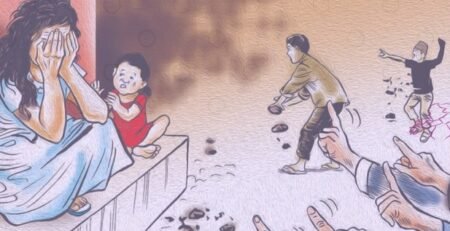Swasthani & Human Rights
“Shree SwasthaniBrata Katha” is
During SwasthaniBrata Katha, Hindu married as well as unmarried women and in some cases men’s are also indulge in the practice of fasting. It is observed that people usually practice fasting in order to fulfill their wish. Women wear red colored clothes and bangals during the one month period of time as it is believed that red is sign of goodluck. The long month rituals are associated with SwasthaniBrata Katha which takes place on the bank of river. In Kathmandu, the festival takes place at “Salinadi”, a river associated with the “Shree SwastaniBrata Katha”, situated in Sankhu. During this holy period, the goddess is worshiped by family members, amid chanting of holy hymns from the book “Shree SwasthaniBrata Katha” which narrates the leelas of goddess Swasthani. According to the “Shree SwasthaniBrata Katha”, first person to observe the fasting of “Shree SwasthaniBrata Katha” was Goddess Parbati with the wish of getting Lord Shiva as her husband. Many people takes fasting of Swastanibratakatha for the welfare and prosperity of the family. Likewise, Goma brahmani and Chandrawati fulfilled their wish in SwastaniBratakatha. There is a belief that taking fast of SwastaniBrata Katha may fulfill the wish of devotees.
Objectives of the Program:
- To get knowledge and information about Shree SwasthaniBrata Katha,
- To get different views and ideas about “Shree SwasthaniBrata Katha” from the different participants,
- To do a comparative study between Shree SwasthaniBrata Katha and Human Rights provided by UN.
Activities carried out:
The program was lead by trainees of Reliance College. Total 16 individuals participated in the program. Those 16 individuals were divided into two groups and asked to pick coupon from 1-8. Those who got identical numbers were asked to introduce their partners. In this way, introduction was carried out. After the introduction session, the review on Shree SwasthaniBrata Katha was done. First of all, Ms. Smriti Rai gave her ideas on when and how shreeswasthanibratakatha is celebrated. After that, Mr. Aashish Tamrakar and Mr. Utsab Ghimire shared their knowledge about the procedures of celebrating SwasthaniBrata Katha. According to them, Shree swasthaniBratakatha commence at the PoushSukla Purnima and conclude at MaghSukla Purnima. During the Brata period, women baths daily and takes only one vegetarian meal a day and reads “Shree SwasthaniBrata Katha”. The routine shouldn’t break. It should go uninterrupted for one month from the date of commencement. When the festival concludes next month, various types of food are prepared to mark the end of the day and it is believed that everything has to be 108 pieces even the flowers. Of the 108 pieces, eight are to be given to the husbands, if there is no husband then to son, and if no son then to the son of a friend, and if no friend then the fasting lady has to formally release it on the nearby river. People of Hindu Religion celebrate this festival/ ritual.
After the review on Shree Swasthani, a discussion was carried out on whether it is Kuriti or not? Kuriti are such improper practices which mentally, physically, sexually, emotionally affects the health of an individual as well as violet their Human Rights. The existing kuriti in Nepal are Dowry system, untouchability, Child Marriage, Polygamy, Chhaupadipratha etc. All the participants of the program gave their views/perception on whether swasthani was kuriti or not. The majority of the participants considered Shree SwasthaniBrata Katha as a kuriti because the procedures of Shree SwasthaniBrata Katha have an effect on their physical health and mental health.
In this program, we also did a comparative study between Shree SwasthaniBrata Katha & Human rights, child rights and women rights provided by UN.
Following are violated Rights:
- Universal Declaration of Human Rights
- Article 16(2): Marriage shall be entered into only with the free and full consent of the intending spouses.
- Chapter 4 page no. 23
- Chapter 12 page no. 114
- Chapter 17 page no. 162
- Chapter 20 page no. 184
- Article 12: No one shall be subjected to arbitrary interference with his privacy, family, home or correspondence, nor to attacks upon his honor and reputation. Everyone has the right to the protection of the law against such interference or attacks.
- Chapter 6 page no. 75
- Chapter 17 page no. 162
- Chapter 22 page no. 197
- Convention on the Elimination of All forms of Discrimination against Women
- Article 16(1b): The same right freely to choose a spouse and to enter into marriage only with their free and full consent.
- Chapter 4 page no. 23
- Chapter 12 page no. 114
- Chapter 17 page no. 162
- Chapter 20 page no. 184
- Convention on the Rights of the Child
- Article 2(2): States Parties shall take all appropriate measures to ensure that the child is protected against all forms of discrimination or punishment on the basis of the status, activities, expressed opinions, or beliefs of the child’s parents, legal guardians, or family members.
- Chapter 20 page no. 184
- Article 16(1): No child shall be subjected to arbitrary or unlawful interference with his or her privacy, family, home or correspondence, nor to unlawful attacks on his or her honor and reputation.
- Chapter 22 page no. 197
- Article 36: States Parties shall protect the child against all other forms of exploitation prejudicial to any aspects of the child’s welfare.
- Chapter 20 page no. 184
- The Constitution of Nepal
Part 3: Fundamental Rights and Duties
- Article 38(3): Right to Women
No woman shall be subjected to physical, mental, sexual,
Psychological or other form of violence or exploitation on grounds of religion,
Social, cultural tradition, practice or on any other grounds. Such act shall be
Punishable by law, and the victim shall have the right to obtain compensation in
Accordance with law.
- Chapter 21 page no. 262
- Article 39(5): Right of the Child
No child shall be subjected to child marriage, transported illegally,
Abducted/kidnapped or taken in hostage.
- Chapter 21 page no. 255
Prepared by SOCH Youth, www.sochnepal.org







Leave a Reply